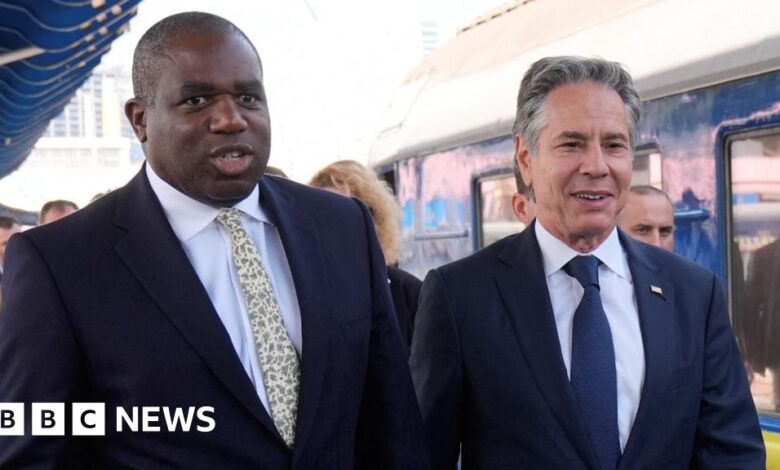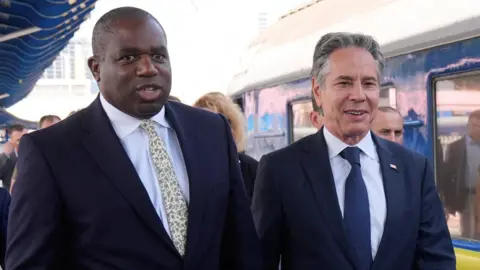Blinken and Lammy pressed to lift limits on long-range missiles

 Reuters
ReutersUS Secretary of State Antony Blinken and British Foreign Secretary David Lammy have arrived in Kyiv on a joint visit as Ukraine continues to push for the right to use US and UK long-range missiles. against Russia.
The two men traveled to the Ukrainian capital together after talks in London. They are expected to meet President Volodymr Zelensky, who has repeatedly called on Washington to ease restrictions on US-supplied weapons.
Blinken said one of their goals was to “hear directly from Ukraine’s leadership” about “their goals and what we can do to support those needs.”
Earlier, US President Joe Biden said his administration was “looking at” whether to lift restrictions.
The policy will come under further scrutiny when British Prime Minister Sir Keir Starmer meets Biden at the White House on Friday.
Ukrainian Prime Minister Denys Shmyhal thanked Lammy for Britain’s military support to Ukraine throughout the war.
But he added: “We hope that the long-range equipment for strikes into enemy territory will come to us and we will have it. We hope to receive your help and support in this matter.”
Currently, the United States and Britain have not granted Ukraine permission to use long-range missiles against targets inside Russia for fear of escalating tensions.
Britain has supplied Ukraine with Storm Shadow missiles, which have a range of about 250km (155 miles). So far they have only been used against Russian targets in occupied Ukraine.
But Ukrainian leaders say they need the missiles to target air bases used by Russian warplanes to launch devastating attacks. glide bomb against Ukraine. These weapons are often launched from deep inside Russian territory.
The Kremlin said on Wednesday that Russia would respond “adequately” if the United States allowed Ukraine to launch missile strikes on its territory.
Asked by reporters on Tuesday whether the United States would lift restrictions on Ukraine’s use of long-range weapons, President Biden said his administration was “working on that right now.”
Earlier this year, the United States eased some restrictions, allowing Ukraine to use long-range missiles to strike areas along the Russian border where troops are firing.
Kyiv’s other allies also supply some long-range weapons — with restrictions on how and when they can be used inside Russia, out of concern that such attacks could lead to retaliation, drag NATO countries into war or spark a nuclear conflict.
During a visit to the UK before heading to Kyiv, Blinken accused Iran of supplying short-range ballistic missiles to Russia, saying they could be deployed against Ukrainians within weeks. Lammy described Iran’s move as “a significant and dangerous escalation”.
These missiles would potentially boost Russia’s arsenal, allowing it to strike Ukrainian cities near the Russian border or areas it already controls, and deploy longer-range missiles deeper into Ukrainian territory.
Iran has repeatedly denied supplying such self-guided weapons to Russia.
On Tuesday alone, the United States, Britain, France and Germany imposes new sanctions on Iran for supplying Russia with ballistic missiles for use in Ukraine.
The measures include restricting the ability of national carrier Iran Air to fly to the UK and Europe – as well as a travel ban and asset freeze on several Iranians accused of facilitating military support for Russia.
Additional reporting by Thomas Mackintosh in London.



